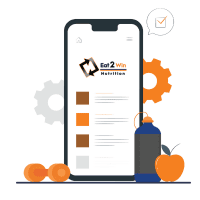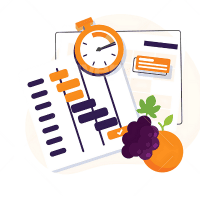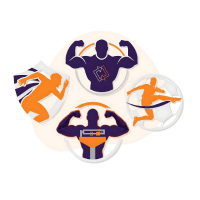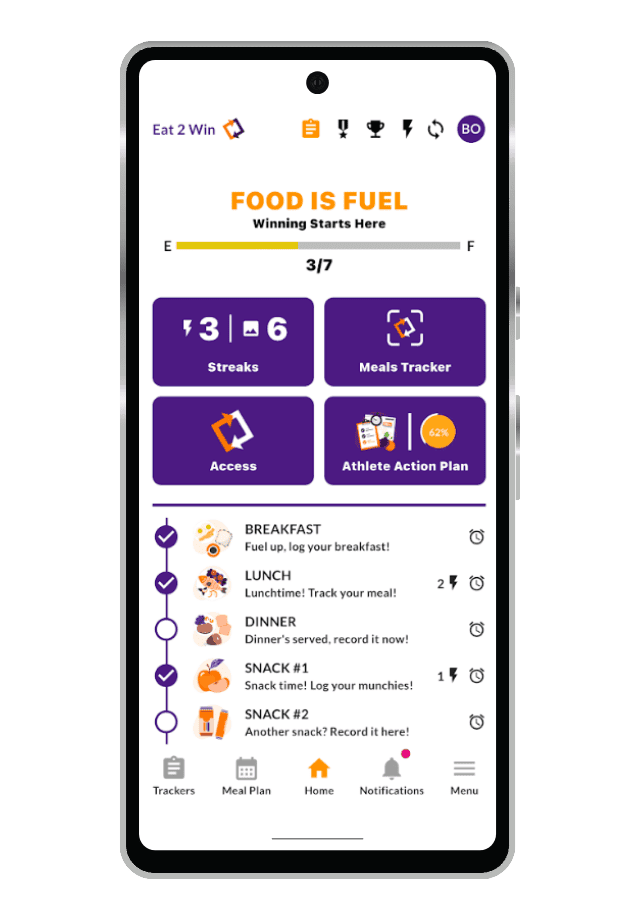
Choices
This is a question I ask athletes quite often as I want to get them thinking about their diet and whether or not they know how well or poor they may be eating. Most athletes don’t keep a food journal so they’re not aware of what their diet may look like over a 24 hour period. Filling out a food log provides you with an overview of when and what you’re eating and usually changes the way an you think about your diet as after reading the article, you will have an understanding of where you are vs. where you need to be, as well as learn the top 10 tips for eating healthier.
- Eating Habits of Athletes_ Perception vs_ Reality.wav00:00
Research
Our research on the perception of eating habits has provided our team with interesting information. We surveyed a high school football team regarding how well they thought they were eating. 88% of High School Athletes perceived their diet was good to excellent as they rated their diet as an A or B. I gave the same athletes a nutrition questionnaire that asked 15 questions ranging from:
a) Do you eat breakfast, lunch, and dinner?
b) Do you have snacks between meals?
c) Do you eat 6-10 servings of Fruits and Veggies?
The survey indicated the average score based on their eating habits gave them an actual grade of a 71 (Low D). This proved to us there is a gap between an athlete’s perception of eating habits and their actual eating habits.
We took it a step further and surveyed a Division 1 football team (90 athletes). 44% of the team ranked their diet as an A or B, another 44% ranked their diet as a C and the final 12% as a D or F.
Top 10 Guidelines to Eating Healthy
To reach your Sports Nutrition goals and get your diet to where it can maximize your health and performance, follow these 10 guidelines:
1. Eat every 3-4 hours – this has been scientifically proven to lower body fat, improve energy levels, and improves strength and performance. Furthermore, eating more frequently throughout the day keeps your blood more sugar stable if choosing the correct carbohydrates and maintains a healthy metabolism.
2. Eat Breakfast everyday – if you’re not eating breakfast, you’re not reaching your potential for top athletic performance. Skipping breakfast causes your body to continue using muscle as a source of energy which increases your risk for losing strength and eventually gaining weight. Eating breakfast starts your metabolism, provides fuel to the brain, and provides energy to working muscles. It only takes 20 seconds to make a PB and J sandwich or take 2 minutes to concoct a smoothie before you leave the house.
3. Consume 6-10 servings of Fruits and Vegetables – keep your immune system healthy and lower your risk for getting sick, improve healing of injuries, and reduce the soreness of your muscles with these high nutrient dense foods.
4. Healthy Snacking between meals – good quality snacks between meals keeps your gas tank close to fuel where you won’t run out of gas. For example, if your last meal is at 12:00 pm (lunch) and you have practice from 3-6 pm, a 2:30 pm snack is essential to get you through your workout and minimize fatigue. Skipping your between meal snacks could increase hunger and over-eating which may increase your body fat.
5. Drink at least ½ your body weight in ounces of fluid to Hydrate – Hydration is critical in keeping energy levels normal as the 1st sign of fatigue is usually related to being dehydrated. For athletes ½ your body weight is a good start but when training, you want to increase your fluid intake to match your losses. For every pound you lose during a practice or session, you want to drink 2-3 cups of fluid to replace the fluid lost.
6. Consume a Post Workout Shake (Carbohydrate and Protein) within 30 minutes after your workout – research has proven over and over again that consuming a combination of carbohydrates and protein immediately after your workout will improve muscle recovery, strength, and muscle size. A dosage of approximately 20-25 grams of protein along with 60-80 grams of carbohydrate is the ideal ratio of carbs to protein to maximize protein synthesis. Liquid is preferred over solid food as it is absorbed faster but a solid meal will suffice.
7. Consume Lean Protein at All Meals – Protein has several benefits for athletes the primary reasons to consume protein at all meals are:
a. Boost metabolism
b. Keeps you full longer
c. Helps Maintain a healthy weight
d. Boost Immune System
e. Improves muscle recovery after workouts
8. Consume Whole Grain Carbohydrates to Fuel Up – carbohydrate is the gasoline for your tank. Whole Grain carbohydrates contain a rich source of fiber which keeps blood sugar stable which in turn keeps energy level high. Examples are 100% whole wheat bread, oatmeal, whole grain cereal, wheat bagels, sweet potatoes, fresh fruit, vegetables, quinoa, legumes, lentils, and beans.
9. Take a Multivitamin Daily – If your diet is not where it needs to be, especially if you’re not consuming nutrient dense foods like fruits, veggies, and whole grains, a multivitamin can act as an insurance policy to supplement your diet with what you’re not getting from food.
10. Take an Omega 3 Fish Oil Supplement – Omega 3 Fish Oil acts as a natural anti-inflammatory agent to help reduce swelling, improve healing, minimize muscle soreness, and improve overall recovery after intense exercise.
Your goal is to make sure you’re striving to accomplish steps 1-8 on a daily basis as if you are; you’re going to be a great shape regarding your performance and body composition goals. If you’re not, start at the top and focus on mastering one option for 3 to 4 weeks until you are doing it every day and then move on to the next task.
Eat 2 Win Nutrition App
Fuel the Champion Within

Trackers
Stay on target with cutting-edge trackers that monitor every step of your journey, ensuring you never miss a beat.

Meal Plan Guides
Simplify your nutrition with easy-to-follow, personalized meal plans that fuel your performance.

Gamification
Stay motivated and engaged by earning rewards and climbing leaderboards as you hit your fitness and nutrition goals.

Access a Sports Dietitian
Get expert guidance and personalized support from a certified Sports Dietitian whenever you need it.

Personalized Programs
Unlock your full potential with personalized programs meticulously crafted to match your unique lifestyle and fitness aspirations.



